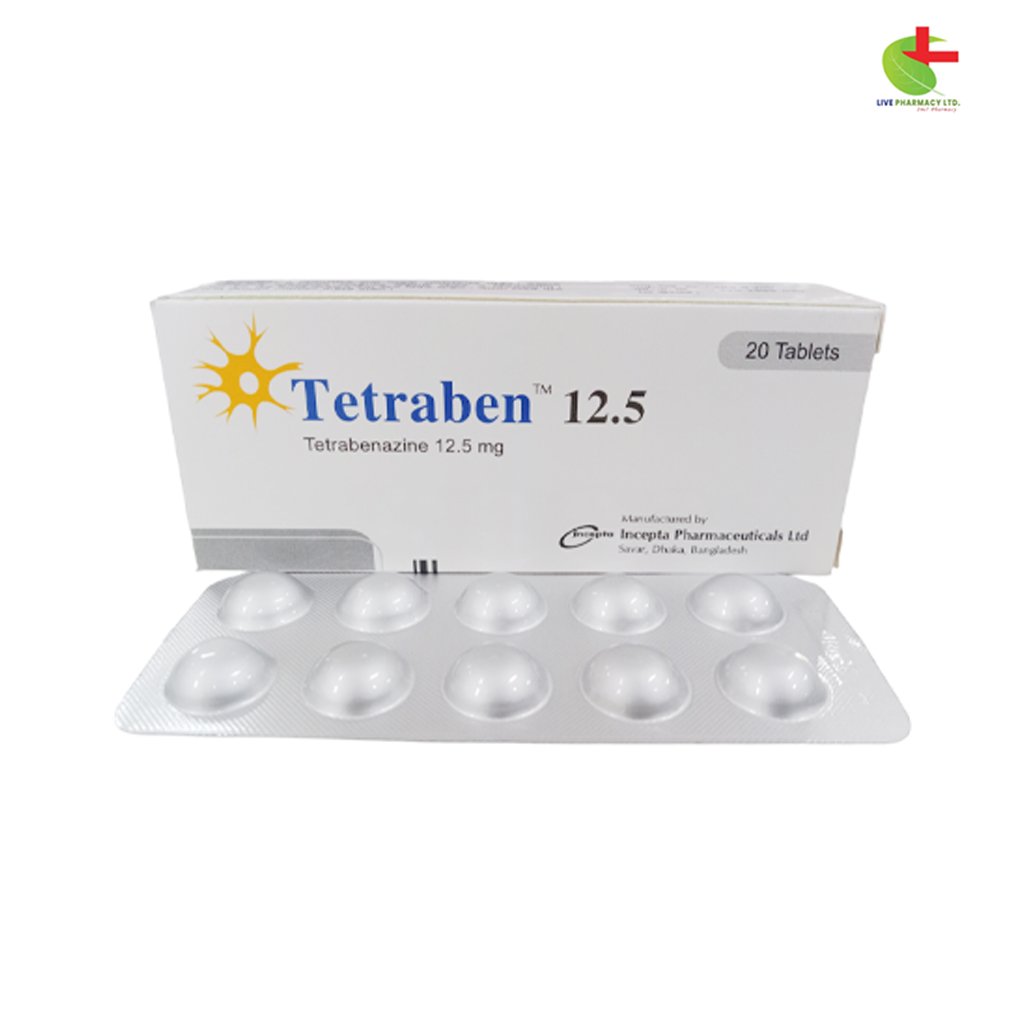Tetraben 12.5
200.00৳ Strip
- Tetrabenazine (Tetraben) is used to treat chorea associated with Huntington’s disease.
- It works by inhibiting the vesicular monoamine transporter-2 (VMAT-2), reducing involuntary movements.
- Dosage is individualized and requires careful titration based on patient response.
- Always use Tetrabenazine under the guidance of a healthcare professional to manage potential side effects and ensure safe use.
 Brand
Brand
|
Incepta Pharmaceuticals Ltd |
|---|---|
 Generics
Generics
|
Tetrabenazine |
 Type
Type
|
Tablet |
Tetrabenazine (Tetraben) – Indications, Dosage, Side Effects, and More
Indications:
Tetrabenazine is primarily used for the treatment of chorea associated with Huntington’s disease.
Always follow the guidance of a registered healthcare professional when using this medication.
Pharmacology:
Tetrabenazine, originally developed as an antipsychotic, is now primarily prescribed for managing hyperkinetic disorders. It acts as a vesicular monoamine transporter-2 (VMAT-2) inhibitor, helping to reduce chorea symptoms in individuals with Huntington’s disease.
Dosage & Administration:
Tetrabenazine can be taken with or without food. Dosage should be individualized and carefully titrated based on the patient’s response.
- Week 1: Start with 12.5 mg daily.
- Week 2: Increase to 25 mg (12.5 mg twice daily).
- Subsequent weeks: Gradually increase by 12.5 mg weekly, up to a dose that effectively controls chorea. The recommended dose is typically 37.5 mg to 50 mg per day, divided into three doses, with no single dose exceeding 25 mg.
Patients needing more than 50 mg/day should undergo genetic testing to assess their CYP2D6 enzyme status, determining whether they are poor or extensive metabolizers.
- For Poor Metabolizers: Maximum daily dose of 50 mg, with no single dose greater than 25 mg.
- For Extensive or Intermediate Metabolizers: Maximum daily dose of 100 mg, with no single dose greater than 37.5 mg.
If serious side effects occur, dose adjustments or discontinuation may be necessary.
Always consult with a registered healthcare professional for personalized dosing advice.
Pediatric and Geriatric Use:
- The safety and effectiveness of Tetrabenazine in pediatric patients have not been established.
- Limited studies on the pharmacokinetics of Tetrabenazine in elderly patients.
Drug Interactions:
- CYP2D6 Inhibitors: If adding a strong CYP2D6 inhibitor (e.g., fluoxetine, paroxetine, quinidine) to treatment, a dose reduction may be required.
- Reserpine: Tetrabenazine and reserpine should not be used together, as they may interfere with each other’s effects. A 20-day gap is recommended between discontinuing reserpine and starting Tetrabenazine.
Can be taken with or without food, as no significant interactions with food have been reported.
Contraindications:
Tetrabenazine should not be used in individuals who:
- Are actively suicidal or have untreated or inadequately treated depression.
- Have significant liver impairment.
- Are taking monoamine oxidase inhibitors (MAOIs) or reserpine.
- Are concurrently using deutetrabenazine or valbenazine.
Side Effects:
Common Side Effects (occur in more than 10% of patients and are at least 5% more common than placebo):
- Sedation, drowsiness, fatigue, insomnia
- Depression, anxiety, akathisia (restlessness)
- Nausea
Rare but serious side effects:
- Suicidal thoughts
- Neuroleptic malignant syndrome (NMS), characterized by fever, muscle rigidity, and confusion
- Pneumonia
Pregnancy & Lactation:
- There is limited information on the use of Tetrabenazine during pregnancy. The developmental risks are not well studied.
- There is no data on whether Tetrabenazine or its metabolites pass into human breast milk.
Precautions & Warnings:
- Regularly assess the benefits of Tetrabenazine against potential risks, including mood changes, cognitive effects, rigidity, and functional capacity.
- Do not exceed the recommended daily dose of 50 mg if using with a CYP2D6 inhibitor.
- In case of Neuroleptic Malignant Syndrome, discontinue treatment immediately.
- Discontinue or reduce the dose if symptoms like agitation, restlessness, akathisia, or parkinsonism occur.
- Tetrabenazine may impair the ability to drive or operate heavy machinery. Exercise caution.
- Not recommended in combination with drugs that prolong the QTc interval.
Overdose:
Symptoms of an overdose may include drowsiness, sweating, and hypothermia. Immediate medical attention is required.
Therapeutic Class:
Atypical neuroleptic drugs.
Storage Instructions:
Store in a cool, dry place, away from light and moisture. Keep out of reach of children.













Reviews
There are no reviews yet.